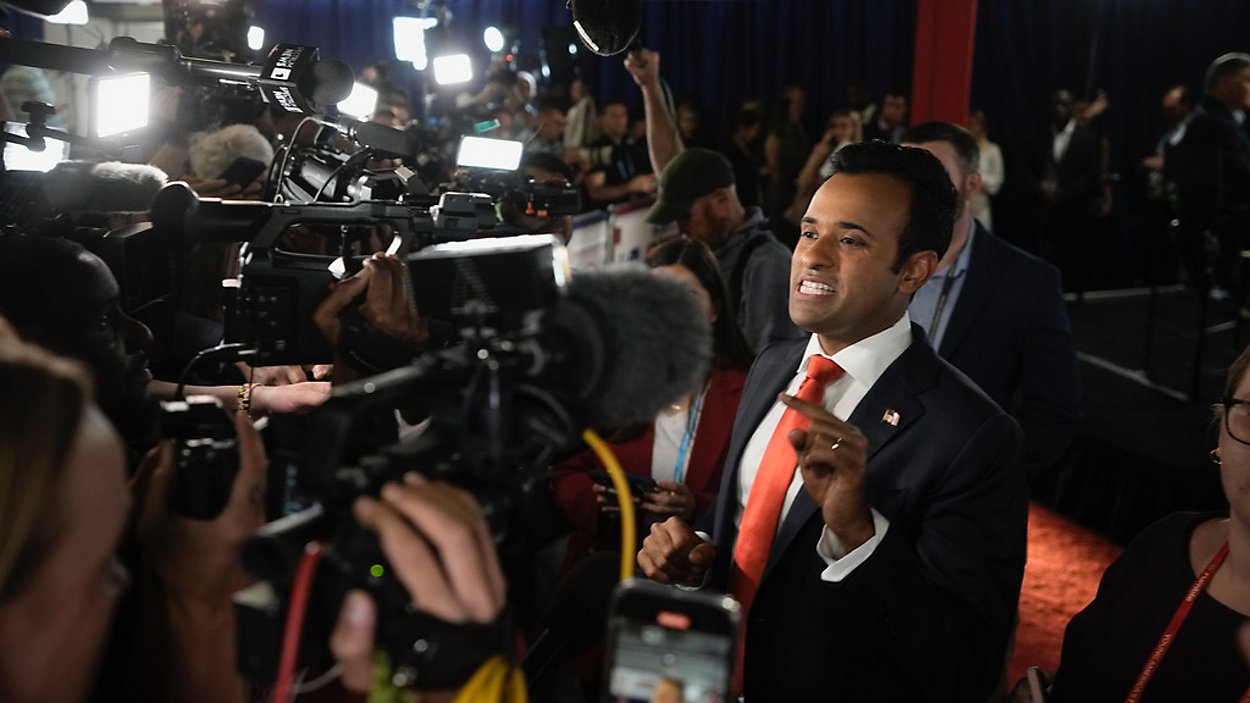States
Ramaswamy Justifies His Denial Of White Supremacy’s Existence

Ramaswamy Justifies His Denial Of White Supremacy’s Existence:
The recent town hall event featuring 2024 GOP presidential contender Vivek Ramaswamy sparked a firestorm about racism in the US. Ramaswamy’s controversial comments, such as equating a Black member of Congress to the KKK Grand Wizard and downplaying white supremacy, have shocked many.
The dispute centers on Ramaswamy’s claim that “our diversity is not our strength.” Critics say such remarks ignore diversity and underprivileged populations’ struggles, especially Black people. His claim that white supremacy is as mythical as unicorns has also aroused uproar since it contradicts the realities of many racial discrimination victims.
Tragic Shooting Highlights The Reality Of Racism
Three Black people were killed in a Jacksonville, Florida, racially motivated shooting 24 hours following Ramaswamy’s incendiary statements. The swastika-adorned AR-15 gunman left manifestos full of racism and hate for Black people. This horrific event highlights the destructive effects of prejudice.
Jacksonville Sheriff T.K. Waters said that the gunman targeted Black persons, confirming the intentions. The tragedy highlights the critical need to combat racism in America and the far-reaching effects of racial hate and violence.
Ramaswamy’s Defense And The Broader Debate
After the debate, Vivek Ramaswamy maintained that white racism does not influence American politics. When racism seemed to be declining, he blamed the media, academics, and politics for producing a “racialized culture.”
His claim that he has encountered current left-wing racism has inflamed the discussion. Critics say his concentration on individual incidences of racism from one side of the political spectrum distracts from systematic racism and its effects on Black people.
Ramaswamy was also criticized for comparing Rep. Ayanna Pressley and Black novelist Ibram Kendi to KKK leaders at an Iowa event. House Democratic leadership criticized candidates and elected officials for their tone in response to his words.
The Jacksonville shooting and racial discussion continue to dominate the public conversation. The event is a melancholy reminder that racism affects Black Americans’ lives and begs for a continuous and open debate on the topic to address the Black community’s ongoing issues and injustices.
The Impact Of Racial Discrimination On Black Communities
Racial discrimination in the US has long been controversial and hurts Black communities. Vivek Ramaswamy’s inflammatory comments have sparked debate, but Black Americans must comprehend racism’s long-term impacts.
Slavery, segregation, and systematic racism have shaped Black people. Discrimination has caused economic inequities, poor education, healthcare disparities, and criminal justice disparities. These gaps cause lower earnings, increased unemployment, and disproportionate criminal justice participation.
Racial prejudice harms mental health. Microaggressions, biases, and racism cause tension, anxiety, and trauma among black people. These psychological impacts may harm well-being and success. Any conversation about racism must acknowledge its devastating effects on Black lives.
Read Also: Illinois Schools Prepare To Implement New Racial Harassment Policy By 2024
The Role Of Political Figures In Shaping The Discourse On Racism
Politicians influence racist discourse and public attitude. Candidates’ utterances may spark arguments and polarize the country, as Vivek Ramaswamy demonstrated. Politicians have the extraordinary ability to promote or oppose bigotry.
Statements that minimize white supremacy or create controversial analogies between Black leaders and the KKK might harm understanding of racism. Such speech may reinforce preconceptions and divide groups.
Conversely, politicians may encourage constructive change. When leaders admit racism and commit to policy reforms and efforts, they may create a more inclusive and equitable society. Combating racial prejudice requires frank discussions about racism and institutional transformation.
The Call For Unity And Action
After Vivek Ramaswamy’s comments and the Jacksonville shooting, there is an increasing need for unity and action. Many people, groups, and organizations stress the need to combat racism collectively and create a more inclusive society.
Promoting legislative reforms, education, and awareness of Black community needs are ways to fight racism. These efforts seek to build a society where diversity is valued, and all races and ethnicities may flourish.
Recent incidents remind us that racism in the US persists. To combat systematic racism and its destructive effects on Black communities, solidarity and action are needed. It calls for collaboration to create a society without discrimination and prejudice.
The Part Of Media In Shaping Perceptions Of Racism
The media shapes public opinions and debates regarding racism. Public opinion and awareness are affected by how racism and contentious political utterances are handled. The reception of Vivek Ramaswamy’s words and the Jacksonville shooting has been shaped by media coverage.
Media sources must correctly and fairly convey events and remarks, offering context and analysis to assist the audience in grasping the more significant ramifications. Media portrayals of racism and reactions may aggravate tensions or promote understanding and empathy.
Journalism must examine the power of words and pictures and provide different voices, especially those from impacted communities, a platform to convey their experiences and viewpoints. Responsible and meaningful reporting on racism may help create a more inclusive and sympathetic society.
The Need For Comprehensive Anti-racism Initiatives
Recent events and debates have highlighted the necessity for robust anti-racism programs. Systemic transformation and the end of institutionalized discrimination are needed to end racism. Criminal justice reform, economic disparity reduction, and diverse education are examples.
It fosters workplace diversity and tackles Black healthcare disparities. Many groups, activists, and communities are creating and implementing anti-racism initiatives. These projects aim to create a society without race and ethnicity and with corrected past inequality.
The Role Of Civil Society
Getting rid of racism is difficult. Community organizations, advocacy groups, and concerned people drive this process. Every level of society must work together for equality and justice. Civil society organizations lead legislative changes and racial inequity awareness campaigns.
Media diversity and police reform transform society. Open discussions, education on racism’s history and effects, and community anti-racist movements may also help. Working together, civil society, government, and the media may significantly reduce racism and its consequences on Black communities.













You must be logged in to post a comment Login